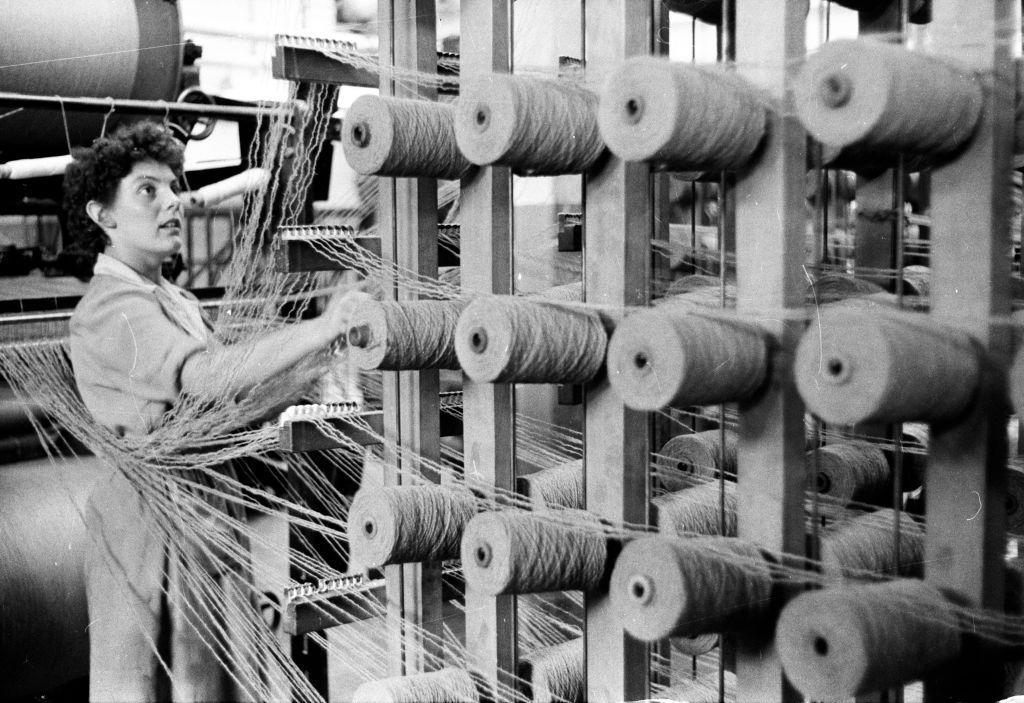Whisky, tractors, carpets and shoes: Kilmarnock in the 1950s

The Blackwood Morton and Sons textile factory employed huge numbers of people in Kilmarnock in the 1950s
- Published
In the 1950s Kilmarnock was home to factories making products as diverse as tractors, whisky, shoes and carpets.
When photojournalist Malcolm Dunbar visited in 1955, he found a thriving industrial town where almost all of the working population was employed.
His photographs of day-to-day life in the Ayrshire town were used to illustrate a feature in Picture Post headlined Is Auld Killie Slump-Proof?
It suggested that the variety of industries - from whisky-producing to shoe-making - would protect Kilmarnock from any economic downturn.
Highly patterned Axminster carpets were prodcued at the plant
Among the biggest employers was the carpet manufacturer Blackwood Morton and Sons, which produced Axminster carpets.
It also made the red carpet for the late Queen Elizabeth's wedding day in 1947, and it was behind the carpets used in the 1997 movie Titanic.
Picture Post reported that in the 1950s it employed about half of Kilmarnock's 3,500 workforce.
But the firm folded in 2005, with the company - by then called Stoddard International - blaming a fall in demand.
The Massey Harris Ferguson tractor factory closed in 1980
Malcolm Dunbar also visited the Massey Harris Ferguson tractor factory in Kilmarnock's Moorfield industrial estate.
It produced in excess of 4,000 vehicles a year, and exported them to more than 70 countries, according to Picture Post.
The plant closed in 1980, with the loss of 1,800 jobs after production moved to France.
The following year local MP William McKelvey told the House of Commons the "cost in misery and humiliation is incalculable". , external
About 1,200 workers were employed at two shoe-making factories in the town which supplied 200 Saxone shoe shops across the UK.
It advertised its products as being "made of honest British leather by British workers at Kilmarnock", and claimed they would last three times longer than any other brand.
But the firm - which could trace its Ayrshire links back to the 1700s - was badly affected by Italian imports in the 1970s and 80s.
The Kilmarnock factory shut in the mid-80s and was later demolished.
The uppers for children's shoes were cut from calf skin at the Saxone factory
For decades Kilmanrock was known as the home of Johnnie Walker whisky and when Picture Post visited, its distillery employed 700 people in the town.
The whisky was first blended and sold from Johnnie Walker's grocery shop in the early 19th Century.
By 1955 its slogan was: "Born in 1820 - still going strong".
The Johnnie Walker factor employed generations of the same families
Its parent company, Diageo, finally closed the Kilmarnock factory in 2012, despite a high-profile campaign by local people.
Three years earlier, when the threat of closure loomed, local MP Des Browne told fellow politicians: "Hardly is there a family in Kilmarnock and the surrounding area that is not connected in some way to the Johnnie Walker plant or to the distribution centre in Barlieth, Hurlford.
"There are thousands of former Johnnie Walker workers in Kilmarnock, hundreds of present Johnnie Walker workers, and many thousands who aspire to be Johnnie Walker workers."
- Published9 January
- Published23 March 2012
The high levels of employment helped support a wide-range of shops and entertainment venues, according to Picture Post.
It featured photographs of young women going to the Plaza cinema, as well as a bustling high street of local and national stores.
Two women were photographed buying tickets for the Plaza cinema
Two women with children chat at the corner of Central Avenue
Traffic moves down King Street towards the Cross junction in Kilmarnock. The stream known as Kilmarnock Water runs underneath King Street
Shoppers outside Hugh Lauder and Co department store
Children outside the town "swimming pond"
Get in touch
What stories you would like BBC News to cover from Glasgow and the west of Scotland?